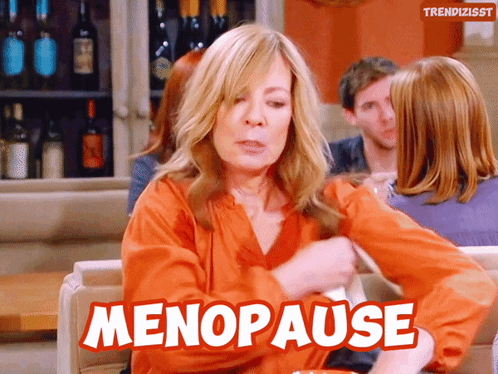Key Highlights
- Menopause is a natural transition in life when periods stop. It is typically diagnosed after going without a menstrual period for 12 months.
- What age is menopause? Typically, it occurs between the ages of 45 to 55. According to the Mayo Clinic, it can happen in your 40s or 50s, but the average age is 51 in the United States.
- The symptoms can vary and may include hot flashes, night sweats, emotion swings, vaginal dryness, and changes in sexual response.
- Hormone therapy (HT) is a treatment option for managing severe menopausal symptoms, but it comes with potential risks that should be discussed with a healthcare provider.
- Lifestyle changes, such as maintaining a healthy diet, exercise, and stress reduction techniques, can also manage menopausal symptoms.
- Postmenopause is the stage after menopause when a woman is no longer able to become pregnant and may experience long-term health considerations such as osteoporosis.
- Here is more information en Español.
How Does Menopause Affect A Woman's Life?
Menopause is a natural and inevitable part of life. It marks the end of the reproductive years and the stopping of menstrual periods. In this transition, also known as natural menopause, the last period typically occurs between the ages of 45 to 55, but the exact timing such as shortest time to longest time varies.
During this stage, ovaries stop releasing eggs, and the body produces less of the hormones estrogen and progesterone. It is the decline in these hormone levels, which can be affected by various factors such as hormonal birth control, that causes the characteristic symptoms of menopause. These symptoms can vary widely, with some experiencing mild discomfort and others facing more severe challenges.
While it is a natural part of aging, it can have a significant impact on physical and emotional well-being. Understanding the symptoms and treatment options can help people navigate this transitional phase with greater ease and comfort. A gov website from the NIH has more information. An up-to-date book from Mary Claire Haver MD, the creator of the Galveston Diet, has information about menopause, called The New Menopause (paid link).

Understanding Menopause
It is a natural part of the aging process. It signifies the end of the reproductive years and the cessation of menstrual periods. It is a normal biological event that occurs as a result of declining hormone levels, particularly estrogen. It is important to note that menopause is not a disease or a medical condition, but rather a natural transition.
A Natural Transition
It is typically preceded by a stage called perimenopause, during which a menstruator may experience irregular periods and other symptoms. The onset of menopause, which can happen earlier in life, is generally considered to have occurred when a previously menstruating person has not had a period for 12 consecutive months, also known as the last menstrual period. Understanding the stages, including the last menstrual period, is crucial to navigating this natural transition.

How Do I Know If I'm in Menopause?
The symptoms of menopause can vary and can range from mild to severe. Some people may experience only a few symptoms, while others may experience multiple symptoms simultaneously.
Estrogen plays a crucial role in a woman's reproductive health and has various effects throughout the body. It helps regulate the menstrual cycle, maintain bone density, and support vaginal health.
As estrogen levels decline during menopause, women may experience symptoms such as hot flashes, night sweats, and changes in sexual response.
Common Signs and Symptoms of Menopause
- Hot flashes: Sudden, intense feelings of heat, often accompanied by sweating and flushing of the face and neck.
- Night sweats: Excessive sweating during sleep that can disrupt sleep patterns and lead to fatigue.
- Mood swings: Emotional changes, including irritability, anxiety, and depression, that can affect daily life and relationships.
- Vaginal dryness: Thinning and inflammation of the vaginal walls, leading to discomfort and pain during intercourse.
- Changes in sexual response: Decreased libido, difficulty achieving orgasm, and changes in sexual satisfaction and desire.
- Sleep disturbances: Insomnia, difficulty falling asleep or staying asleep, and disrupted sleep patterns.
- Weight gain: Hormonal changes during menopause can contribute to added weight, particularly around the belly area.
Physical and Emotional Changes
Menopause can bring about various physical and emotional changes. These changes are primarily due to the declining levels of estrogen and progesterone in the body. Some common physical changes include vaginal dryness, changes in skin elasticity, and weight gain, particularly around the belly.
Emotionally, it can be a challenging time for many. Mood changes, including irritability, anxiety, and depression, are common during this stage. The hormonal fluctuations can affect neurotransmitters in the brain, leading to changes in mood and emotional well-being.
It is important to prioritize self-care and seek support from healthcare providers, friends, and family members. Open communication and understanding can help navigate the physical and emotional changes associated with menopause.

What Conditions Can Cause Premature Menopause?
Conditions or factors can contribute to early menopause. Additionally, a UK study has shown that a higher consumption of oily fish and fresh legumes can delay the timing of natural menopause, leading to a later menopause. It is important to discuss any concerns or questions about early menopause with a healthcare provider to understand the underlying causes and explore potential treatment options.
Navigating Through: Diagnosis & Tests
Diagnosing menopause is primarily based on someone's symptoms and menstrual history. In most cases, no specific tests are required to confirm menopause. However, certain tests may be performed to rule out other conditions and to assess overall health during the transition.
Tests and Procedures for Confirmation
While there is no definitive test to confirm menopause, a healthcare provider may perform certain tests to assess hormone levels and overall health. Blood and urine tests can be used to measure estradiol, follicle-stimulating hormone (FSH), and luteinizing hormone (LH), which can help your health care provider determine if you are close to it or if you have already gone through it. Your provider may need to repeat testing your hormone levels several times to confirm your status if you have not completely stopped menstruating. Understanding the tests and procedures for confirming menopause is important for health.
In some cases, a pelvic exam may be performed to assess the health of the reproductive organs and rule out other conditions. A DXA scan may also be recommended to assess bone health and screen for osteoporosis.

Comprehensive Treatment Options
According to the Mayo Clinic, "Menopause requires no medical treatment." Keep this in mind.
That said, the treatment options aim to alleviate symptoms and improve quality of life during this transitional phase. These options can include a cleaner, nutritious diet and regular exercise; hormone therapy; alternative remedies; mental health care; relationship therapy; being in a safe, like-minded community like ours in Slack; communication with your family, friends, employer and work teams; and lifestyle adjustments.
Hormonal, Diet, and Non-Hormonal Treatments
Hormone therapy (HT) is a common treatment option for managing symptoms. It may involve taking bio-identical (bHRT) hormones (hormone replacement therapy or HRT), such as estrogen, progesterone, or testosterone.
Alternative remedies, such as acupuncture, herbal supplements (paid link) and lifestyle adjustments like maintaining a healthy diet and regular exercise, may also help manage symptoms. It is important to discuss these options with a healthcare provider to determine the most appropriate treatment plan for each individual.
Some find relief from symptoms by incorporating certain herbal supplements, such as black cohosh, or red clover, into their routine. Some supplements are thought to mimic the effects of estrogen (paid link) in the body, so it is important to consult with a healthcare professional before taking them.
Maintaining a good diet like The Galveston Diet (paid link) with the cookbook (paid link), getting regular exercise, and practicing stress reduction techniques, such as yoga, breathwork, or meditation, can also help. Some women find that avoiding triggers, such as caffeine or spicy foods, can help reduce the frequency and severity of hot flashes. It is always recommended to consult with a healthcare provider before starting any new treatment or making significant changes.

Dealing with Hot Flashes and Night Sweats
Hot flashes and night sweats are common and can be managed through various approaches. Hormone therapy (bHRT or HRT or HT) may be an effective treatment option for reducing the frequency and severity of hot flashes and night sweats. Avoiding triggers, dressing in layers, and practicing relaxation and breathwork, can also help manage these symptoms. Some women find relief from hot flashes by using cooling products or taking cold showers. A gov website from the NIH has more information in Spanish and English.
Strategies for Managing Emotions and Sleep Issues
Emotional changes and sleep issues are common challenges. Cognitive behavioral therapy (CBT) can help manage emotions by providing strategies for coping with stress and emotions. Sleep hygiene practices, such as maintaining a regular sleep schedule and creating a relaxing bedtime routine, can improve sleep quality. It is also important to prioritize self-care and practice stress reduction techniques, such as deep breathing, prayer, or meditation, to promote emotional well-being.
Long-Term Health Considerations
Menopause can have long-term health implications for people in the United States, particularly in relation to heart disease and breast cancer. It is important for women to be aware of these considerations and take steps to protect their health, especially by educating themselves on things like estrogen therapy. The NIH, an official government organization, has more information here. Check for secure websites when searching for information.
Post-Menopause Health Risks and Prevention
After menopause, women are at an increased risk for certain health conditions. Cardiovascular disease, including heart disease and stroke, becomes a greater concern. It is important for women to manage their blood pressure, cholesterol levels, and other risk factors for heart disease. Regular exercise and not smoking can help reduce the risk of heart disease and blood clots. It is also important to be aware of the potential risks of hormone therapy, which can include blood clots, and to discuss any concerns with your healthcare provider. Incontinence can also be something to watch.
Importance of Bone Health
Postmenopausal women are also at an increased risk for osteoporosis, a condition characterized by decreased bone density and increased risk of fractures. It is important for women to prioritize bone health by getting adequate calcium and vitamin D, engaging in weight-bearing exercises, and discussing testing with their healthcare provider.
Living a Fulfilling Life for After Menopause
Post-menopause marks a new phase of life for women, and it is important to embrace it with positivity and focus on living a fulfilling life.

Enhancing Your Sex Life
Vaginal dryness is a common symptom that can impact a woman's sexual health and satisfaction. Using water-based lubricants or vaginal moisturizers can help alleviate discomfort and improve sexual pleasure. Hormone therapy, such as vaginal estrogen treatments, can also be effective in managing vaginal dryness. Open communication with a partner and exploring different sexual techniques can help maintain a satisfying sex life.
Staying Active and Emotionally Balanced
Leading a healthy, social, and active lifestyle can have a positive impact on overall well-being. Regular exercise, such as walking, swimming, or yoga, can help improve cardiovascular health and boost mood. Emotional well-being can be promoted through activities such as prayer, going to religious or spiritual services, practicing mindfulness, or seeking support from friends, family, or a therapist. Prioritizing self-care and engaging in activities that bring joy and fulfillment can contribute to a fulfilling life at any stage.
In Conclusion
Each person's experience of menopause is unique and can significantly impact someone's life. It is essential to consult with a healthcare provider to discuss sensitive information like individual symptoms and treatment options.
Frequently Asked Questions
Do Men Go Through Menopause?
Male menopause, known as andropause, happens to men too. Find more information about andropause (manopause in internet terms), on our website.
What did you learn about menopause that surprised you?
Menopause can start as early as your 30s! This perimenopausal stage can bring unexpected symptoms like irregular periods and mood swings. It's essential to recognize these signs early for proper management and care during this natural transition.
As an Amazon Associate, Climaterica earns from qualifying purchases.





